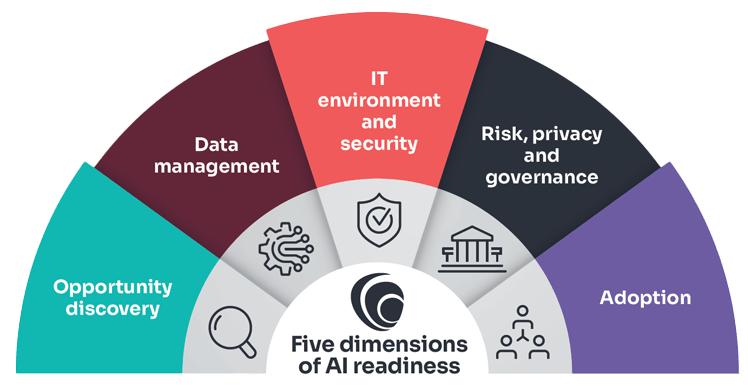
Article
Get started on your AI journey with an AI readiness assessment
With 76% of IT leaders agreeing that generative AI will be significant or transformative for their organizations [1] the integration of artificial intelligence (AI) has become not just a trend, but a necessity for organizations to remain competitive and relevant. However, the journey towards AI implementation is not a simple one – AI readiness requires careful planning, strategic alignment and a comprehensive understanding of your organizational landscape.
Organizations must not only consider the technological aspects, but also focus on how AI will be deployed, adopted and used within their workforce. Your AI strategies must enable quick pivoting to adapt to evolving social, technical, economic and political trends in real-time. As AI accelerates change and disrupts industries, organizations must transition from outdated contingency planning models to a philosophy of readiness for constant change.
Embarking on or advancing your journey in AI begins with a pivotal first step: conducting a comprehensive AI readiness assessment.
5 Dimensions of AI readiness
Consider the following five key dimensions of AI readiness:

- Opportunity discovery: Identify where AI can add value within your organization and develop a strong business case to justify investment into AI initiatives.
- Data management: Understand the current state of your data landscape to identify key systems and datasets to leverage for AI.
- IT environment and security: Evaluate your hardware, software, licenses and security controls to ensure a safe environment for AI deployment and usage.
- Risk, privacy and governance: Implement a robust risk management framework, data privacy controls and governance processes to ensure safe data usage and compliance with regulatory frameworks. Certify that content created by AI is subject to governance processes including review prior to being released externally.
- Adoption: Leverage effective change management practices to enhance data and AI literacy, create shared understanding, build trust and drive cultural alignment to democratize the use of data and AI and foster understanding within your workforce. Your workforce should be using AI tools to make their jobs easier, serve customers better and fuel your innovation engine going forward.
Of these five dimensions, there are three overarching components organizations need to consider:
- Data and technology – Do you have the right systems, datasets, controls and governance in place to leverage AI in a safe and responsible manner?
- Organizational alignment – How are your AI initiatives strategically aligned to your organizational goals?
- People – How can you deploy AI so that your workforce understands how to responsibly leverage the technology to accelerate the pace of their work to become more efficient and innovative to ultimately create more value for your customers?
AI readiness assessment
An AI readiness assessment evaluates your organization’s current state in each of the five dimensions listed above to identify risks and gaps that need to be addressed prior to launching or accelerating AI initiatives. This assessment considers not only the technological aspects, but also your strategic alignment and workforce readiness, ensuring a holistic approach to AI adoption.
By conducting an AI readiness assessment, your organization is provided a road map tailored to your specific needs, detailing recommendations of what must be in place to leverage AI in a safe, responsible and productive way.
Mitigating risks
It’s important to deploy AI in a way that prioritizes safety and responsibility across your organization. As AI tools have the capability to sift through your organization’s entire data landscape, they may inadvertently access sensitive data users were unaware they had access to. This risks inadvertently releasing AI-generated content containing proprietary, trade secret, classified or confidential information, posing significant reputational, financial and legal liabilities.
It’s essential your workforce be able to recognize the potential risks associated with AI and understand how to utilize these tools effectively. Rather than placing unwavering trust in AI-generated content, employees should have a level of skepticism, conduct their own research, cite sources and verify the accuracy of the content prior to external release.
Additionally, impending AI regulations pose a substantial risk to organizations. Although the U.S. has established AI guidelines, comprehensive state and federal regulatory frameworks are being developed, demanding adherence from both public and private sector organizations. Inadequate preparation for AI deployment could jeopardize your organization’s compliance with these upcoming regulations. Non-compliance might compel a temporary suspension of ongoing AI operations, necessitating adjustments to meet regulatory standards, thereby escalating the time, effort and resources required for AI initiatives. It is prudent to align with the latest governance and risk management practices to fortify your organization against future regulatory changes.
Lastly, when AI is introduced without proper preparation, employees may revert to familiar manual processes or perceive AI as a threat to their jobs, leading to a reluctance to adopt. Successful AI deployments requires upskilling of your existing workforce to empower them to effectively leverage AI in their daily workflow. Your workforce should be encouraged to leverage the AI tools you invest in to drive innovation and productivity.
How we can help
As AI continues to reshape industries and redefine possibilities, investing in AI readiness today is an investment in the future success of your organization. Baker Tilly’s digital team can help your organization undergo an AI readiness assessment to unlock the full potential of your AI systems, while mitigating any potential risks and fostering a workforce culture of understanding and innovation.
Interested in learning more? Contact one of our professionals today.
Source:
[1] Generative AI readiness is shockingly low – these 5 tips will boost it, CIO
